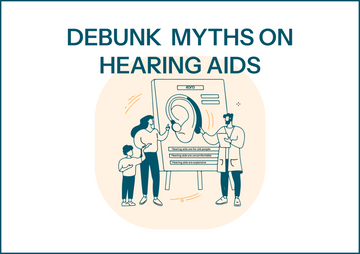In today's fast-paced world, effective communication is key to building meaningful relationships, thriving in professional settings, and enjoying life to the fullest. Unfortunately, hearing loss affects millions of individuals globally, causing significant barriers to communication. Fortunately, hearing aids have emerged as a revolutionary solution for those struggling with hearing impairment. In this article, we will explore how hearing aids can positively affect communication skills, empowering individuals to reconnect with the world around them.
Understanding Hearing Aids
Hearing aids are small electronic devices designed to amplify sound for individuals experiencing hearing loss. These devices come in various shapes and sizes and are tailored to suit different types of hearing loss, from mild to profound. By amplifying sound, hearing aids can help users recognize speech, identify sounds in their environment, and engage in conversations more confidently.
The Basics of How Hearing Aids Work
Hearing aids operate using a simple mechanism: they capture sound, enhance the volume, and deliver it directly into the ear. The core components of a typical hearing aid include:
- Microphone: Converts sound waves into electrical signals.
- Amplifier: Increases the strength of the signals.
- Speaker: Converts the amplified signals back into sound waves.
- Battery: Provides power for the device.
Modern hearing aids also come equipped with advanced technology features that enhance user experience, including noise reduction, directional microphones, and Bluetooth connectivity, allowing users to connect wirelessly to other devices.
The Link Between Hearing and Communication
Communication encompasses much more than spoken language; it includes non-verbal cues such as facial expressions, body language, and tone of voice. When hearing loss interferes with auditory input, it can lead to misunderstandings, frustration, and social withdrawal. Hence, addressing hearing loss through hearing aids can significantly improve communication skills, leading to better interpersonal interactions.
Improved Auditory Awareness
One of the most significant benefits of wearing hearing aids is the restoration of auditory awareness. Individuals who have struggled with hearing loss often miss critical sounds that convey meaning in conversations. For instance, missing inflections or tone can lead to misinterpretations of intent. By amplifying sounds, hearing aids help users capture these auditory nuances, resulting in enriched communication competency.
Enhanced Speech Recognition
Hearing aids improve speech recognition by making conversations clearer and easier to follow. As users can better distinguish between different sounds, they can engage more confidently in discussions. This improvement can be particularly beneficial in social settings, such as family gatherings or work meetings, where multiple voices may compete for attention. Consequently, those with hearing aids are more likely to participate actively without feeling left out.
The Psychological Impact of Hearing Aids on Communication Skills
Beyond the physical advantages, there is a psychological dimension to wearing hearing aids that can dramatically influence communication skills. Having access to clear sound can reduce anxiety and boost self-esteem, allowing individuals to interact more freely.
Reduction of Social Isolation
Individuals with untreated hearing loss may feel isolated, as they struggle to converse and connect with others. This continued withdrawal can lead to feelings of loneliness and depression. By improving their hearing abilities through hearing aids, users can re-establish social connections, fostering a sense of belonging and community.
Increased Confidence
Confidence is a vital component of effective communication. When individuals feel uncertain about their ability to hear and understand, they may shy away from conversations. Hearing aids empower users by providing them with the tools they need to engage seamlessly in dialogue. With renewed confidence, those who wear hearing aids are more likely to contribute ideas and express themselves freely, further enhancing their communication skills.
Empowering Conversations: How Hearing Aids Make a Difference
Effective communication is a two-way street. The impact of hearing aids goes beyond just helping the user; they also influence how others communicate with them. When hearing-impaired individuals can hear clearly, their responses become more aligned with the conversation. Here are some ways hearing aids empower conversations:
Active Listening
Hearing aids enable active listening by allowing users to focus on the speaker's voice without straining to hear. Active listening involves fully concentrating on the message, understanding it, and responding thoughtfully. With hearing aids, individuals can engage in active listening, fostering more meaningful and impactful conversations.
Encouraging Open Dialogue
As communication improves, individuals wearing hearing aids may find that others are more willing to engage in open dialogue. When both parties can hear and understand each other effectively, conversations often flow more smoothly. This can lead to deeper discussions, better conflict resolution, and a more genuine exchange of ideas.
Challenges and Considerations
While hearing aids significantly improve communication skills for many, there are challenges that users may face during their adjustment period. Understanding these challenges is crucial for maximizing the benefits of hearing aids.
Adjustment Period
When individuals first begin to wear hearing aids, they may experience discomfort or a sense of overload due to the influx of amplified sounds. This adjustment period varies from person to person, requiring patience and support from family and friends. With time, users typically acclimate to their devices and thrive in their communication abilities.
Maintaining Realistic Expectations
Though hearing aids greatly enhance communication, users should maintain realistic expectations. There may still be situations where background noise poses challenges, or where specific frequencies may not be captured perfectly. Open communication with hearing healthcare professionals can help users adapt and optimize their hearing aids for the best outcomes.
Supporting Resources for Individuals Using Hearing Aids
To make the most of the hearing aids experience, users can take advantage of various resources and support systems:
Hearing Health Professionals
Regular consultations with hearing health professionals are essential for optimizing the use of hearing aids. These experts can provide valuable insights into device settings, maintenance, and troubleshooting. They can also conduct assessments to ensure that the hearing aid is tailored to the user’s specific needs.
Support Groups and Communities
Connecting with support groups can prove invaluable for individuals adjusting to hearing aids. These groups offer a platform to share experiences, challenges, and tips, fostering a sense of camaraderie. Whether online or in person, support groups can help users feel less isolated and more empowered in their communication journeys.
The Future of Communication with Hearing Aids
The role of hearing aids in enhancing communication skills is likely to continue evolving. With advances in technology, hearing aids are becoming smarter, featuring innovations such as artificial intelligence and machine learning that adapt to user preferences and environments.
Telehealth and Remote Support
The rise of telehealth services has enabled remote support for hearing aid users. Through mobile apps and virtual consultations, users can receive guidance and adjustments without the need for in-person visits. This flexibility is especially beneficial for those with mobility issues or those living in remote areas.
Integration of Smart Technology
As we embrace an increasingly digital world, hearing aids will continue to integrate seamlessly with other smart technologies. For instance, hearing aids may come equipped with features that allow users to adjust settings via smartphone apps, connect to streaming devices, and even participate in video calls without compromising audio clarity.
Unlocking the Power of Communication
Hearing aids hold the potential to transform lives by bridging the gap caused by hearing loss. From enhancing auditory awareness to fostering confidence and connection, hearing aids have a profound impact on communication skills. By investing in hearing support, individuals can unlock new opportunities for personal and professional growth, fostering richer relationships and more fulfilling interactions. The journey to effective communication begins with understanding the importance of hearing health and embracing the power of hearing aids.

























